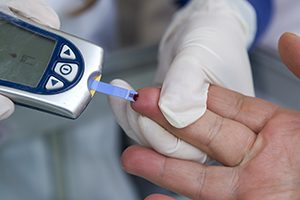 The first clue to diabetes may be in your mouth!
The first clue to diabetes may be in your mouth!
In many cases it’s the dentist–and not the physician–who has the first opportunity in the early detection of diabetes, because diabetics are especially prone to dental problems.
Swollen, tender, bleeding and receding gums, loose teeth, and a sore tongue may not just be signs of poor dental health. They may be danger signals for diabetes, too. If you have any of these symptoms, you may be one of the millions of Americans who has diabetes.
Diabetes occurs when a gland called the pancreas fails to produce sufficient amounts of the hormone, insulin, to regulate blood sugar levels. In other words: Diabetics have too little insulin and too much sugar in their blood. When this happens, the body tissue can’t convert the sugar it needs into energy. The blood stream then fills with this unused sugar and the result is diabetes.
A serious illness which respects neither age, sex, race nor income level, diabetes is the leading cause of blindness in people 20 to 65 years old and can lead to kidney failure, heart attacks and even death. But outside the dental community, few people realize that diabetics have more than their share of tooth and periodontal (gum) problems. This fact is especially true for undiagnosed diabetics or those who have failed to control their disease adequately with insulin and/or diet and exercise.
Periodontal disease among diabetics progresses rapidly, recurs frequently, and heals slowly. The resistance to treatment can lead to loosened teeth and premature tooth loss.
Your regular dental cleanings at our office provide the best chance for early detection of many health problems, including diabetes. If you have a diabetic tendency, we may refer you to your physician for further testing–another good reason to keep your prescribed dental recall appointments faithfully!
If you are diabetic, it’s important that you keep your dental health history up-to-date, exercise regularly, and eat a diet that provides good nutrition:
- Have regular meals and snack times.
- Don’t skip meals.
- Avoid sweets (cake, candy, pie, ice cream).
- Limit use of animal fats and trim fat off meats. Avoid butter, cream, egg yolks.
- Bake and broil rather than fry foods.
- Don’t use alcohol, wine, or beer without your doctor’s permission.
- See your dentist regularly so small dental problems can be taken care of with a local anesthetic. (Teeth don’t heal themselves, so small problems turn into big ones if left untreated. Major oral surgery requires a general anesthetic which means “no food prior to surgery”—a problem for diabetics.)

